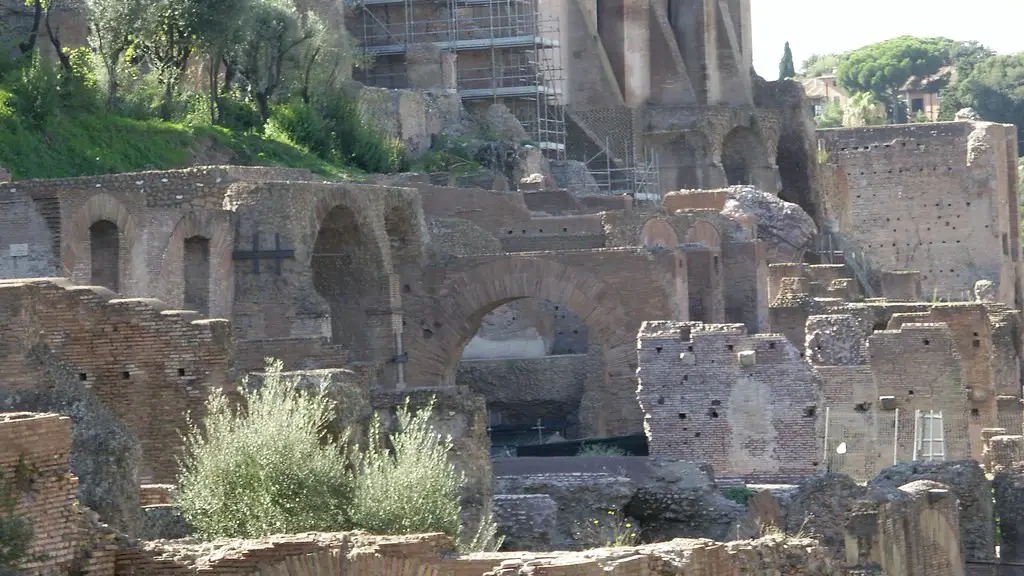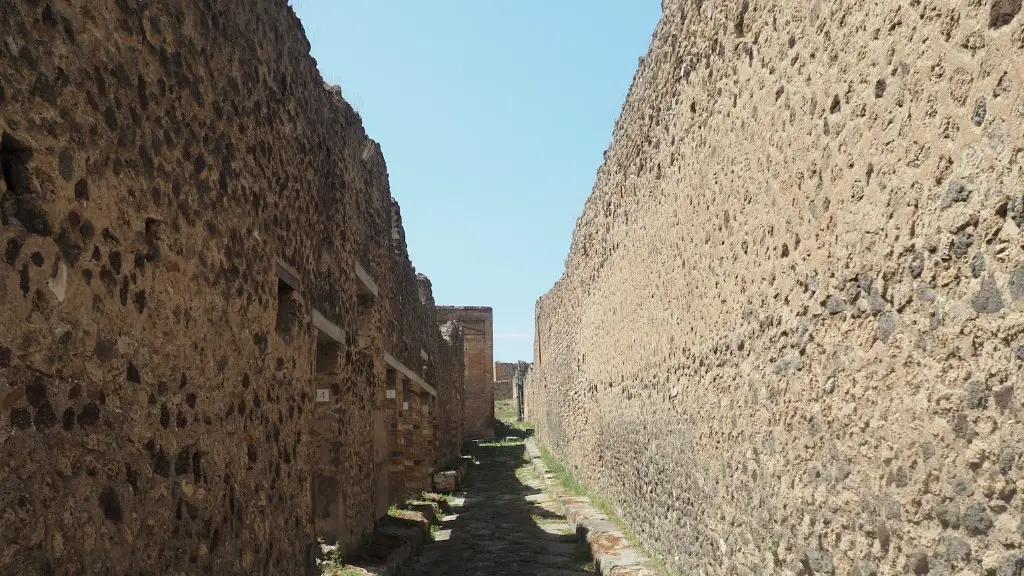The Alps have been an important geographical feature of Europe’s history, playing an influential role in the trajectory of ancient Rome. The strategic location of the Alps enabled Rome to become a superpower, and contributed to the expansion of their empire and its borders. The strategic benefits of the Alps included protection from invaders, increased access to trade routes, and enhanced communications throughout Europe.
At the height of its power Rome was the largest and most influential civilization in Europe and the Mediterranean basin. The strategic mountain range, provided a natural and formidable barrier to invading forces seeking to penetrate the core territory of Rome, as it was extremely difficult to scale or even approach in some places. The importance of the Alps to the security of Rome can be seen in the numerous fortifications and castles which were built at various points along the mountain range. In addition, the terrain provided natural advantages in strategic defense, as the mountain range made it difficult for enemies to march around and attack Rome from different directions.
Another advantage of the Alps was the increased opportunities for trade. The location of Alpine passes enabled Rome to have greater control over the access of goods between neighbouring regions, enabling trade to flourish and generate economic wealth and prosperity. Through trade, Rome was able to benefit from the resources and materials of other cultures, as well as export their own products. In addition, the passes of the Alps facilitated the movement of merchants, merchants and travelers in both directions throughout Europe.
The Alps were also important for the communication and exchange of ideas. Rome was able to facilitate the spread of its own political and religious ideologies, which helped to spread its influence throughout Europe. In addition, it made it easier for government messengers and officials to move throughout the empire quickly, allowing Rome to better control its citizens.
Overall, the Alps provided a number of strategic benefits for Rome that allowed it to become a superpower. Its location as a natural barrier against invaders, increased trading opportunities, and improved communication enabled Rome to expand their territory and influence to become one of the most powerful empires in history.
Economic Importance of Alps
The strategic location of the Alps provided the Roman Empire with great economic advantages. Through control of the passes through the Alps, Rome controlled trade and commerce between other regions. Thus, Rome was able to derive economic gain from trading with other cultures as well as exporting their own products to other regions. In addition to this, Rome was also able to benefit from increased travelling merchants and travelers that passed through their territories.
Moreover, the Alps also provided Rome with a reliable source of manpower for their military. The great number of people that travelled through the region allowed Rome to raise loyal and committed troops from its own citizens and from the those of other countries. In addition, the great number of people that came through the region also created a vast customer base for the products and services offered by Rome. This enabled Rome to further strengthen its economic position in the region.
The strategic location of the Alps was also used by Rome for religious purposes. They fostered their own polytheistic ideal, connecting it to the symbolic importance of their mountain range. This helped to strengthen the legitimacy of the Roman Empire in the international arena, while also providing them with access to the religious beliefs and practices of neighbouring regions.
Overall, the economic importance of the Alps for Rome was significant. Through trade and commerce, Rome was able to increase their wealth and power. In addition, it provided them with a reliable source of military personnel, while also connecting them to the religious beliefs of neighbouring regions.
Political Impact of Alps on Rome
The strategic location and immense size of the Alps enabled Rome to dominate the political scene in Europe and the Mediterranean. Through control of the mountain passes, Rome was able to gain a distinct advantage over its rivals, as it was better able to maintain its territorial integrity and protect itself from potential invaders. This enabled Rome to solidify their borders and expand their territory towards other regions.
Additionally, control of the mountain range also enabled Rome to control the communication within the region. Rome was able to construct an impressive road network within the Alps known as the Via Roma, helping to connect different parts of the empire. This technical masterpiece enabled the communication of ideas and information, as well as providing opportunities for trade and commerce.
In addition, the mountain range also provided Rome with a powerful political symbol. Rome connected the Alps to their own religious values and political ideology, helping to solidify their rule within Europe and the Mediterranean. This enabled Rome to gain the loyalty of its own citizens, as well as demonstrating their power and authority to rival regions.
Overall, the Alps provided Rome with a distinct advantage in their political ambitions. Through control of the passes, Rome was able to gain territorial advantages, while also establishing a powerful communication network through the Via Roma. In addition, it also provided them with a strong political symbol, helping to strengthen their control within the region.
Cultural Significance of Alps
The location and size of the Alps enabled Rome to expand their culture and influence to the rest of Europe. The passes of the mountain range provided increased opportunities for the communication of cultural practices, ideas, and beliefs. As merchants, travelers, and tourists came through the region, they became exposed to Roman customs and ways of life. In turn, these new discoveries became adopted by other cultures, further enabling the expansion of Rome’s cultural legacy.
In addition, the mountain range also provided a backdrop for some of the most influential and celebrated Roman festivals. In particular, the Roman Games were celebrated on the slopes of the Alps, providing locals and travelers with the opportunity to partake in athletic competitions, theatrical performances, and religious ceremonies. The grandeur and scale of these festivals greatly increased the reputation of Rome in the region and throughout Europe.
Moreover, the Alps also provided a direct link with the gods. Mountains were symbols of strength in the region and were considered to be closer to the gods. In turn, this enabled citizens of Rome to feel a deeper connection with the divine. Thus, Rome was able to influence the spiritual beliefs of other cultures, while also establishing its own religious values within Europe and the Mediterranean.
Overall, the Alps provided Rome with an opportunity to spread their culture and influence throughout the region. Through increased opportunities for the communication of their culture and beliefs, Rome was able to extend its reach and establish its own distinctive identity. In addition, it provided them with a direct link with the gods, making it easier for them to gain the loyalty of their own citizens.
Technological Benefits of Alps
The strategic location of the Alps enabled Rome to gain a number of technological advantages. Through control of the mountain range, Rome was able to construct an impressive road system known as the Via Roma. This enabled communication and transportation of goods to be carried out throughout the region. The roads also provided a great opportunity for merchants and travelers from other regions to travel through Rome and gain access to goods, services, and ideas from other cultures.
In addition, the architecture of the Alps was also important. Rome was able to build numerous fortifications and castles throughout the mountain range to protect the core areas of their territory. Moreover, the steep terrain of Alpine mountains provided additional strategic benefits during wartime, such as preventing large-scale invasions and attacks. In turn, this enabled Rome to maintain their political and territorial integrity to a greater extent.
The strategic location of the Alps also enabled Rome to benefit from mineral resources. Ancient Romans discovered a variety of minerals in the mountains, including copper, silver, and gold. This helped to support and finance their military, as well as increase their economic wealth and prosperity. Rome was also able to construct transportation systems such as tunnels and canals for other purposes.
Overall, the strategic advantages of the Alps to Rome are clear. Through control of the mountain passes and their natural terrain, Rome was able to construct an impressive network of roads, fortifications, and castles. In addition, the Roman Empire was able to benefit from the natural resources within the mountain range, as well as access the goods, services, and ideas of other cultures.
Historical Impact of Alps on Rome
The Alps have been a major feature in the history of Rome and its impact on Europe can still be felt today. Its strategic location enabled Rome to become a superpower and expand its influence throughout the region. Through control of the mountain passes, Rome was able to maintain its political and territorial integrity, while also gaining access to trade routes and commodities from other cultures. In addition, the Alpine mountain range provided an impressive spectacle for cultural and religious events, helping to increase the prestige of Rome in the region.
Furthermore, control of the mountain range enabled Rome to construct an impressive road system throughout Europe and the Mediterranean. Through the Via Roma, Rome was able to facilitate the communication of ideas and information between different regions. This enabled Rome to develop its own political and cultural beliefs, while also allowing them to compete with rival nations for control of Europe.
Moreover, the historical impact of the Alps can still be seen today. Despite the fall of the Roman Empire centuries ago, its influence on European civilization can still be felt. The mountain range still exists as an important geographical feature in the region and is even used as an international border in some places. In addition, its impact on religious, cultural, and political life in Europe can still be seen today.
Overall, the Alps were essential for the success of Rome. Its strategic geographical location provided Rome with numerous advantages, allowing it to become a superpower and expand its influence throughout Europe. This enabled Rome to develop their own brand of cultural and political beliefs, as well as control access to valuable commodities and resources. In turn, this enabled Rome to become one of the leading civilizations in the history of the world.





